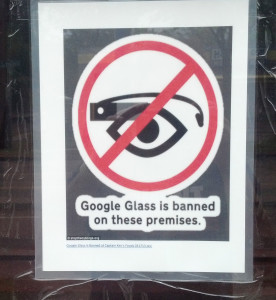Google Glass, the search giant’s foray into wearable augmented reality technology, has generated considerable interest within and beyond the tech community, and generally positive press. The glasses-like device essentially overlays a close-to-the-eye computer display over whatever is in the wearer’s field of vision, and provides smartphone-like features through Bluetooth voice commands.
But while it’s an intriguing technology with some fascinating potential applications, Google Glass is likely to, if perhaps not quite fail, then succeed only as a niche product—not like the broad consumer applications Google loves (search, AdWords, Android, YouTube, etc.).

First, anyone who’s not self-conscious about having a Bluetooth headset protruding from their ear is unlikely to be concerned with how they look wearing Google Glass. Second, the appearance issue is easily fixable: make Google Glass look like aviator shades. Suddenly the wearer looks like a Tom Cruise character instead of just a rich dweeb.
No, Google Glass will fail—or succeed only in limited, niche applications—because both valid concerns and not-entirely-unreasonable-Google-paranoia will cause the product to be banned in many of the locations where it isn’t already impractical.
So, is Google Glass half-full…
First, among the applications where Glass may find a home:
Tourism and travel: imagine being able to walk the streets of an unfamiliar city and get instant information about your location, transit options, nearby restaurants and attractions, the architect who designed the building you are looking at…pretty much anything. For walking tours, you could download an app that would automatically display supplemental information to what the tour guide is saying based on where your gaze lands.
Gaming: get off your couch! Google Glass creates some amazing opportunities for game players. No longer limited to their flat-screen TVs or the imaginations of the game creators, gamers will be able to shoot zombies, Nazis, and aliens popping out from behind the couch, the car, the backyard fence—any object in any place where such behavior is allowed and doesn’t look too strange.
Medicine: Google Glass offers a wealth of opportunities in this area, from assisting with diagnosis to keeping vital signs within view during surgery. Harvard’s John Nosta recently wrote an outstanding article for Forbes about how Google Glass is changing medical education.
Field work: this technology can be used to provide critical supplemental information to professionals across a wide range of “in the field” professions, from land surveying to civil engineering to underground inspections to on-site equipment repair—pretty much any application where visual information is needed, instantly, outside the office or home environment.
Exercise: though the current version would be close to worthless here, a more comfortable, rugged, and considerably lower-priced versions would be ideal for runners, cyclists and others who want to track heart rate, miles traveled, calories burned, and other fitness activity tracker metrics.
…or half empty?
The above applications and others offer promising niche market opportunities for Google Glass. But unfortunately for the goal of making this a widely adopted, mass market technology, there are many more places where the technology is likely to be banned outright. Among them:
Any secure area: these are not limited to nuclear facilities and government laboratories, where most of us don’t spend much time anyway. The sign above was actually posted in a small factory / retail outlet that makes and sells bulk foodservice items like baked beans, chili, and au gratin potatoes. The owners ban Google Glass because they don’t want anyone stealing their recipes or techniques.
Google Glass may be banned anywhere the collection and recording of too much visual information could present a business or security risk…even, potentially, airports.
Meetings: it’s highly likely that Google Glass will be banned at business events and meetings. Meeting organizers are already frustrated by the electronic distractions offered to attendees via their smartphones (checking emails, Facebook, Twitter, Instagram…). Google Glass takes the potential for distraction to an entirely new, and one would suspect generally unwelcome, level.
Driving: cell phones are a dangerous distraction, even in hands-free mode. Google Glass would make that problem far worse by creating visual as well as audible distraction. Look for the wearing of Google Glass while driving to be banned by legislatures across the globe. Unless, perhaps, one is wearing Google Glass while riding in a driverless Google Car.
Retail stores: showrooming is already a serious problem for brick-and-mortar retailers, costing an estimated $217 billion in lost sales annually. Though the practice isn’t difficult, it does currently require some degree of work by consumers; Google Glass would alleviate even that modicum of effort. It could also be used by competitors to see, in real time, a retailer’s pricing, selection and display for any and every item in the store. It would be surprising if retailers don’t start banning Google Glass in their shops.
Public performances: cameras and video recorders are already barred in most theaters, concert venues, arenas and stadiums. Banning Google Glass would be a logical extension of those bans. With file sharing having sucked so much income out of the recording industry, musical artists now rely on concert revenue more than ever before. The NFL famously prohibits even “accounts of the game” without consent; what team is going to allow 60,000 real-time recording devices in the stands?
Courtrooms: as with theaters and arenas, cameras are recording devices are already banned. It’s virtually inconceivable an exception would be made for Google Glass.
In short, Google Glass represents a fascinating technology, but one with ultimately limited usefulness. Niche applications may be enough for Google, but given the company’s history, once the limitations of the market become clear, it wouldn’t be shocking to see Glass go the way of Google Reader, Knol, Buzz, Picnik, Jaiku, and other products in the Google graveyard.
What do you think?
Read more: